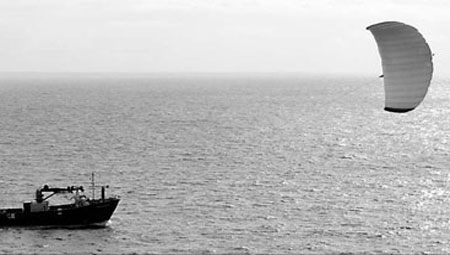Turning ocean winds into gold while cutting greenhouse emissions
in the process might sound like some sort of alchemy for the 21st
century.
But unlike futile earlier efforts to convert ordinary metals to
gold, two fast-growing German companies have worked together
developing a high-tech kite system to pull enormous ships across
the oceans - and save enormous amounts of money.
The 132 meter long MV Beluga SkySails will make its maiden
voyage in January across the Atlantic to Venezuela, up to Boston
and back to Europe.
It will be pulled by a giant computer-guided US$725,000 kite
tethered to a 15-meter high mast.
A high-tech kite to slash
fuel consumption and cut greenhouse gas emissions, known as
SkySails, pulls the vessel MS Beaufort. The MV Beluga SkySails, the
world's first commercial merchant ship to use the system, was
launched in Hamburg on Saturday. (photo: Reuters via China
Daily)
It is a throwback to an earlier maritime age, harnessing the
winds that fell out of favor over a century ago when sailing lost
the battle for merchant shipping to modern steam power because it
was seen then as primitive and unpredictable.
But now, in the age of climate change, wind power is making a
remarkable comeback thanks to modern technology.
"This is the start of a revolution for the way ships are
powered," Beluga chief executive Niels Stolberg said in an
interview on the windswept deck of his new ship MV Beluga SkySails.
"It's a small but crucial step for the future."
To latch onto the powerful winds prevailing well above the
surface, the kite attached to the high-tech steerage unit flies up
to 300 meters high to tug the 10,000-ton ship forward, supporting
its diesel engines and cutting fuel consumption.
Under favorable wind conditions, the 160-square metre kite
shaped like a paraglider is expected to reduce fuel costs by up to
20 percent or more (US$1,600 per day) and cut, by a similarly
significant amount, its carbon dioxide emissions.
Burning fossil fuels cause CO2 emissions blamed for climate
change.
A driving force for Beluga - and other shippers already lining
up to buy the system if it delivers on its promise - is the fuel
price, which has tripled for shippers in recent years.
While it might seem almost too simple - or too good - to be
true, SkySails inventor Stephan Wrage and German engineers have
spent more than five years perfecting the system and they will tell
you that it is anything but pie-in-the sky technology.
"At the heart of this all for me, the real motivating factor is
to get to the crossroads of ecology and economics - and to prove it
pays to protect the environment," Wrage said in an interview on the
ship so new it still smells of fresh paint.
While some political and industry leaders complain about the
financial burdens of fighting climate change and cite costs in
resisting CO2 reduction efforts, Wrage said SkySails is proof that
the opposite can be true: there's money to be made.
"If our calculations are right, our clients will not only have
considerably greater earnings but also substantially reduce their
CO2 output as well," the 35-year-old added after a ceremony to
christen the new ship in Hamburg port on Saturday.
"To be able to make a contribution to fighting climate change
makes us all proud," the SkySails managing director said as the
sail made of ultralight synthetic fibre and as big as a
medium-sized passenger jet unfurled in a breeze above the deck.
SkySails developed the kite propulsion system that Beluga
Shipping only just finished installing on the new cargo ship. Both
firms aim to prove on a commercial scale what years of testing on
smaller vessels showed: you can turn wind into cash.
(Agencies via China Daily December 17, 2007)


